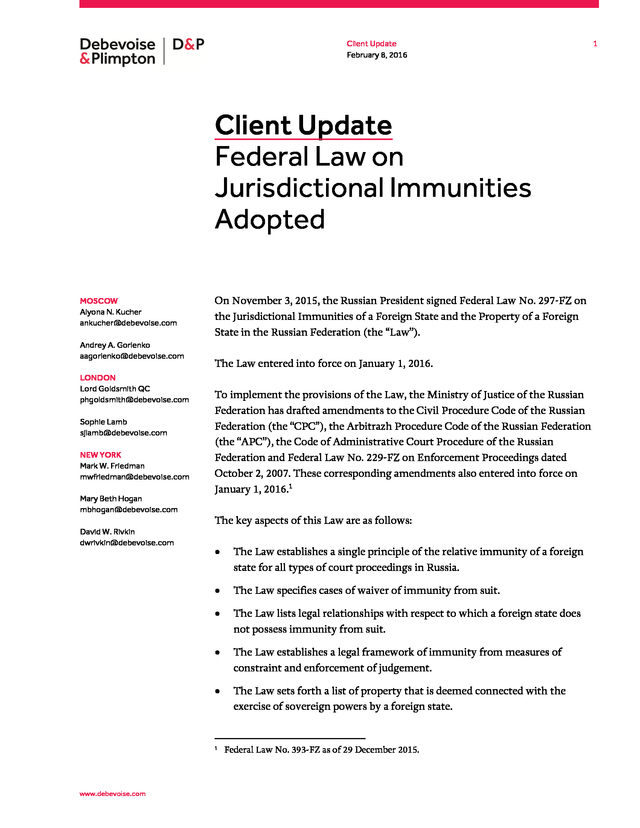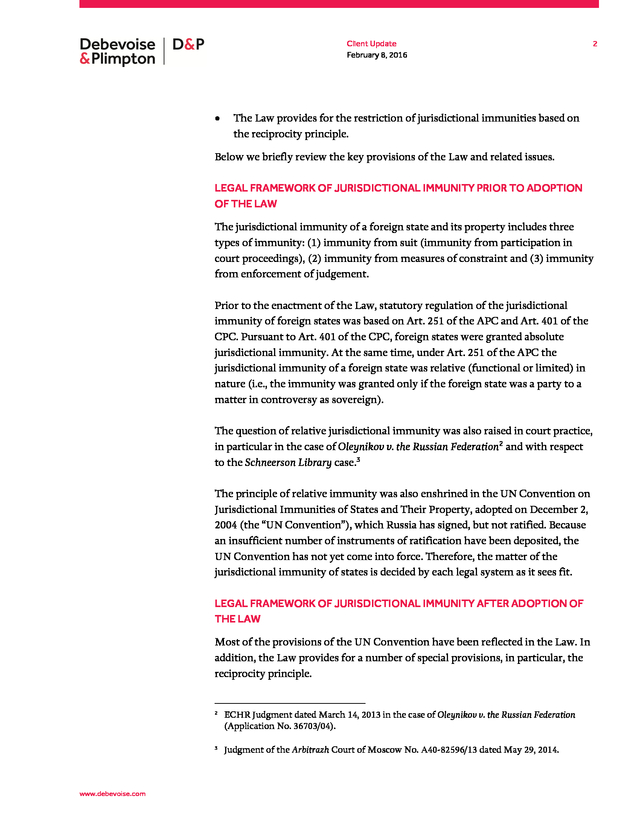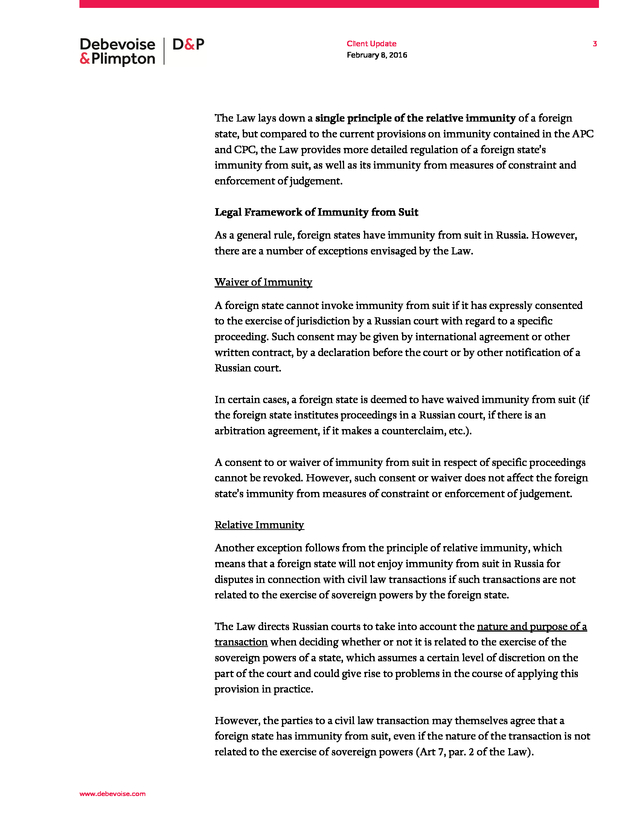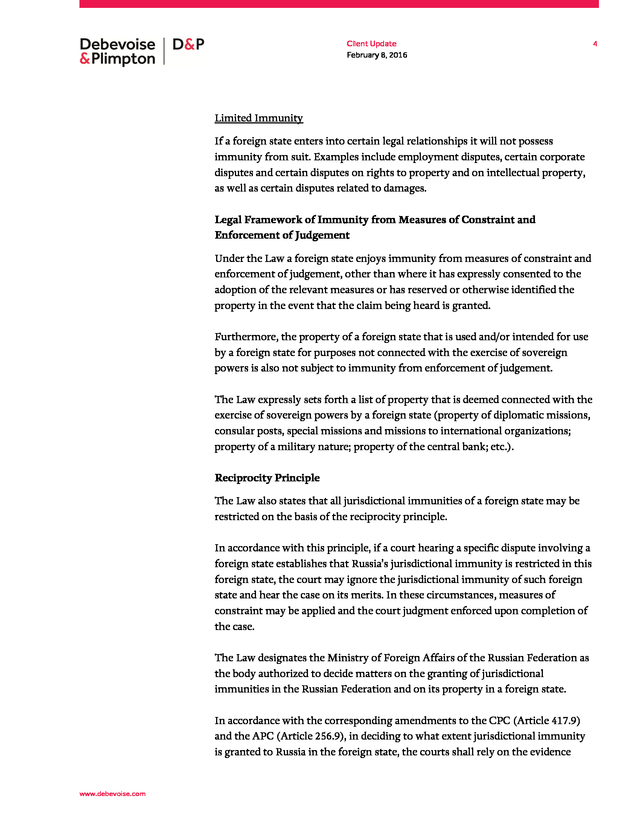Description
Client Update
February 8, 2016
Client Update
Federal Law on
Jurisdictional Immunities
Adopted
MOSCOW
Alyona N. Kucher
ankucher@debevoise.com
Andrey A. Gorlenko
aagorlenko@debevoise.com
LONDON
Lord Goldsmith QC
phgoldsmith@debevoise.com
Sophie Lamb
sjlamb@debevoise.com
NEW YORK
Mark W. Friedman
mwfriedman@debevoise.com
Mary Beth Hogan
mbhogan@debevoise.com
David W.
Rivkin dwrivkin@debevoise.com On November 3, 2015, the Russian President signed Federal Law No. 297-FZ on the Jurisdictional Immunities of a Foreign State and the Property of a Foreign State in the Russian Federation (the “Law”). The Law entered into force on January 1, 2016. To implement the provisions of the Law, the Ministry of Justice of the Russian Federation has drafted amendments to the Civil Procedure Code of the Russian Federation (the “CPC”), the Arbitrazh Procedure Code of the Russian Federation (the “APC”), the Code of Administrative Court Procedure of the Russian Federation and Federal Law No. 229-FZ on Enforcement Proceedings dated October 2, 2007.
These corresponding amendments also entered into force on January 1, 2016.1 The key aspects of this Law are as follows: ï‚· The Law establishes a single principle of the relative immunity of a foreign state for all types of court proceedings in Russia. ï‚· The Law specifies cases of waiver of immunity from suit. ï‚· The Law lists legal relationships with respect to which a foreign state does not possess immunity from suit. ï‚· The Law establishes a legal framework of immunity from measures of constraint and enforcement of judgement. ï‚· The Law sets forth a list of property that is deemed connected with the exercise of sovereign powers by a foreign state. 1 www.debevoise.com Federal Law No. 393-FZ as of 29 December 2015. 1 . Client Update February 8, 2016 ï‚· 2 The Law provides for the restriction of jurisdictional immunities based on the reciprocity principle. Below we briefly review the key provisions of the Law and related issues. LEGAL FRAMEWORK OF JURISDICTIONAL IMMUNITY PRIOR TO ADOPTION OF THE LAW The jurisdictional immunity of a foreign state and its property includes three types of immunity: (1) immunity from suit (immunity from participation in court proceedings), (2) immunity from measures of constraint and (3) immunity from enforcement of judgement. Prior to the enactment of the Law, statutory regulation of the jurisdictional immunity of foreign states was based on Art. 251 of the APC and Art. 401 of the CPC. Pursuant to Art.
401 of the CPC, foreign states were granted absolute jurisdictional immunity. At the same time, under Art. 251 of the APC the jurisdictional immunity of a foreign state was relative (functional or limited) in nature (i.e., the immunity was granted only if the foreign state was a party to a matter in controversy as sovereign). The question of relative jurisdictional immunity was also raised in court practice, in particular in the case of Oleynikov v.
the Russian Federation2 and with respect to the Schneerson Library case.3 The principle of relative immunity was also enshrined in the UN Convention on Jurisdictional Immunities of States and Their Property, adopted on December 2, 2004 (the “UN Convention”), which Russia has signed, but not ratified. Because an insufficient number of instruments of ratification have been deposited, the UN Convention has not yet come into force. Therefore, the matter of the jurisdictional immunity of states is decided by each legal system as it sees fit. LEGAL FRAMEWORK OF JURISDICTIONAL IMMUNITY AFTER ADOPTION OF THE LAW Most of the provisions of the UN Convention have been reflected in the Law.
In addition, the Law provides for a number of special provisions, in particular, the reciprocity principle. 2 3 www.debevoise.com ECHR Judgment dated March 14, 2013 in the case of Oleynikov v. the Russian Federation (Application No. 36703/04). Judgment of the Arbitrazh Court of Moscow No.
Ð40-82596/13 dated May 29, 2014. . Client Update February 8, 2016 3 The Law lays down a single principle of the relative immunity of a foreign state, but compared to the current provisions on immunity contained in the APC and CPC, the Law provides more detailed regulation of a foreign state’s immunity from suit, as well as its immunity from measures of constraint and enforcement of judgement. Legal Framework of Immunity from Suit As a general rule, foreign states have immunity from suit in Russia. However, there are a number of exceptions envisaged by the Law. Waiver of Immunity A foreign state cannot invoke immunity from suit if it has expressly consented to the exercise of jurisdiction by a Russian court with regard to a specific proceeding. Such consent may be given by international agreement or other written contract, by a declaration before the court or by other notification of a Russian court. In certain cases, a foreign state is deemed to have waived immunity from suit (if the foreign state institutes proceedings in a Russian court, if there is an arbitration agreement, if it makes a counterclaim, etc.). A consent to or waiver of immunity from suit in respect of specific proceedings cannot be revoked. However, such consent or waiver does not affect the foreign state’s immunity from measures of constraint or enforcement of judgement. Relative Immunity Another exception follows from the principle of relative immunity, which means that a foreign state will not enjoy immunity from suit in Russia for disputes in connection with civil law transactions if such transactions are not related to the exercise of sovereign powers by the foreign state. The Law directs Russian courts to take into account the nature and purpose of a transaction when deciding whether or not it is related to the exercise of the sovereign powers of a state, which assumes a certain level of discretion on the part of the court and could give rise to problems in the course of applying this provision in practice. However, the parties to a civil law transaction may themselves agree that a foreign state has immunity from suit, even if the nature of the transaction is not related to the exercise of sovereign powers (Art 7, par.
2 of the Law). www.debevoise.com . Client Update February 8, 2016 Limited Immunity If a foreign state enters into certain legal relationships it will not possess immunity from suit. Examples include employment disputes, certain corporate disputes and certain disputes on rights to property and on intellectual property, as well as certain disputes related to damages. Legal Framework of Immunity from Measures of Constraint and Enforcement of Judgement Under the Law a foreign state enjoys immunity from measures of constraint and enforcement of judgement, other than where it has expressly consented to the adoption of the relevant measures or has reserved or otherwise identified the property in the event that the claim being heard is granted. Furthermore, the property of a foreign state that is used and/or intended for use by a foreign state for purposes not connected with the exercise of sovereign powers is also not subject to immunity from enforcement of judgement. The Law expressly sets forth a list of property that is deemed connected with the exercise of sovereign powers by a foreign state (property of diplomatic missions, consular posts, special missions and missions to international organizations; property of a military nature; property of the central bank; etc.). Reciprocity Principle The Law also states that all jurisdictional immunities of a foreign state may be restricted on the basis of the reciprocity principle. In accordance with this principle, if a court hearing a specific dispute involving a foreign state establishes that Russia’s jurisdictional immunity is restricted in this foreign state, the court may ignore the jurisdictional immunity of such foreign state and hear the case on its merits. In these circumstances, measures of constraint may be applied and the court judgment enforced upon completion of the case. The Law designates the Ministry of Foreign Affairs of the Russian Federation as the body authorized to decide matters on the granting of jurisdictional immunities in the Russian Federation and on its property in a foreign state. In accordance with the corresponding amendments to the CPC (Article 417.9) and the APC (Article 256.9), in deciding to what extent jurisdictional immunity is granted to Russia in the foreign state, the courts shall rely on the evidence www.debevoise.com 4 . Client Update February 8, 2016 provided by the parties and the official opinions of state bodies, i.e., of the Ministry of Foreign Affairs of the Russian Federation. Adoption of the Law is of practical importance for settlement of disputes involving foreign states in the Russian Federation. *** We would be happy to answer any questions you may have regarding the above. www.debevoise.com 5 .
Rivkin dwrivkin@debevoise.com On November 3, 2015, the Russian President signed Federal Law No. 297-FZ on the Jurisdictional Immunities of a Foreign State and the Property of a Foreign State in the Russian Federation (the “Law”). The Law entered into force on January 1, 2016. To implement the provisions of the Law, the Ministry of Justice of the Russian Federation has drafted amendments to the Civil Procedure Code of the Russian Federation (the “CPC”), the Arbitrazh Procedure Code of the Russian Federation (the “APC”), the Code of Administrative Court Procedure of the Russian Federation and Federal Law No. 229-FZ on Enforcement Proceedings dated October 2, 2007.
These corresponding amendments also entered into force on January 1, 2016.1 The key aspects of this Law are as follows: ï‚· The Law establishes a single principle of the relative immunity of a foreign state for all types of court proceedings in Russia. ï‚· The Law specifies cases of waiver of immunity from suit. ï‚· The Law lists legal relationships with respect to which a foreign state does not possess immunity from suit. ï‚· The Law establishes a legal framework of immunity from measures of constraint and enforcement of judgement. ï‚· The Law sets forth a list of property that is deemed connected with the exercise of sovereign powers by a foreign state. 1 www.debevoise.com Federal Law No. 393-FZ as of 29 December 2015. 1 . Client Update February 8, 2016 ï‚· 2 The Law provides for the restriction of jurisdictional immunities based on the reciprocity principle. Below we briefly review the key provisions of the Law and related issues. LEGAL FRAMEWORK OF JURISDICTIONAL IMMUNITY PRIOR TO ADOPTION OF THE LAW The jurisdictional immunity of a foreign state and its property includes three types of immunity: (1) immunity from suit (immunity from participation in court proceedings), (2) immunity from measures of constraint and (3) immunity from enforcement of judgement. Prior to the enactment of the Law, statutory regulation of the jurisdictional immunity of foreign states was based on Art. 251 of the APC and Art. 401 of the CPC. Pursuant to Art.
401 of the CPC, foreign states were granted absolute jurisdictional immunity. At the same time, under Art. 251 of the APC the jurisdictional immunity of a foreign state was relative (functional or limited) in nature (i.e., the immunity was granted only if the foreign state was a party to a matter in controversy as sovereign). The question of relative jurisdictional immunity was also raised in court practice, in particular in the case of Oleynikov v.
the Russian Federation2 and with respect to the Schneerson Library case.3 The principle of relative immunity was also enshrined in the UN Convention on Jurisdictional Immunities of States and Their Property, adopted on December 2, 2004 (the “UN Convention”), which Russia has signed, but not ratified. Because an insufficient number of instruments of ratification have been deposited, the UN Convention has not yet come into force. Therefore, the matter of the jurisdictional immunity of states is decided by each legal system as it sees fit. LEGAL FRAMEWORK OF JURISDICTIONAL IMMUNITY AFTER ADOPTION OF THE LAW Most of the provisions of the UN Convention have been reflected in the Law.
In addition, the Law provides for a number of special provisions, in particular, the reciprocity principle. 2 3 www.debevoise.com ECHR Judgment dated March 14, 2013 in the case of Oleynikov v. the Russian Federation (Application No. 36703/04). Judgment of the Arbitrazh Court of Moscow No.
Ð40-82596/13 dated May 29, 2014. . Client Update February 8, 2016 3 The Law lays down a single principle of the relative immunity of a foreign state, but compared to the current provisions on immunity contained in the APC and CPC, the Law provides more detailed regulation of a foreign state’s immunity from suit, as well as its immunity from measures of constraint and enforcement of judgement. Legal Framework of Immunity from Suit As a general rule, foreign states have immunity from suit in Russia. However, there are a number of exceptions envisaged by the Law. Waiver of Immunity A foreign state cannot invoke immunity from suit if it has expressly consented to the exercise of jurisdiction by a Russian court with regard to a specific proceeding. Such consent may be given by international agreement or other written contract, by a declaration before the court or by other notification of a Russian court. In certain cases, a foreign state is deemed to have waived immunity from suit (if the foreign state institutes proceedings in a Russian court, if there is an arbitration agreement, if it makes a counterclaim, etc.). A consent to or waiver of immunity from suit in respect of specific proceedings cannot be revoked. However, such consent or waiver does not affect the foreign state’s immunity from measures of constraint or enforcement of judgement. Relative Immunity Another exception follows from the principle of relative immunity, which means that a foreign state will not enjoy immunity from suit in Russia for disputes in connection with civil law transactions if such transactions are not related to the exercise of sovereign powers by the foreign state. The Law directs Russian courts to take into account the nature and purpose of a transaction when deciding whether or not it is related to the exercise of the sovereign powers of a state, which assumes a certain level of discretion on the part of the court and could give rise to problems in the course of applying this provision in practice. However, the parties to a civil law transaction may themselves agree that a foreign state has immunity from suit, even if the nature of the transaction is not related to the exercise of sovereign powers (Art 7, par.
2 of the Law). www.debevoise.com . Client Update February 8, 2016 Limited Immunity If a foreign state enters into certain legal relationships it will not possess immunity from suit. Examples include employment disputes, certain corporate disputes and certain disputes on rights to property and on intellectual property, as well as certain disputes related to damages. Legal Framework of Immunity from Measures of Constraint and Enforcement of Judgement Under the Law a foreign state enjoys immunity from measures of constraint and enforcement of judgement, other than where it has expressly consented to the adoption of the relevant measures or has reserved or otherwise identified the property in the event that the claim being heard is granted. Furthermore, the property of a foreign state that is used and/or intended for use by a foreign state for purposes not connected with the exercise of sovereign powers is also not subject to immunity from enforcement of judgement. The Law expressly sets forth a list of property that is deemed connected with the exercise of sovereign powers by a foreign state (property of diplomatic missions, consular posts, special missions and missions to international organizations; property of a military nature; property of the central bank; etc.). Reciprocity Principle The Law also states that all jurisdictional immunities of a foreign state may be restricted on the basis of the reciprocity principle. In accordance with this principle, if a court hearing a specific dispute involving a foreign state establishes that Russia’s jurisdictional immunity is restricted in this foreign state, the court may ignore the jurisdictional immunity of such foreign state and hear the case on its merits. In these circumstances, measures of constraint may be applied and the court judgment enforced upon completion of the case. The Law designates the Ministry of Foreign Affairs of the Russian Federation as the body authorized to decide matters on the granting of jurisdictional immunities in the Russian Federation and on its property in a foreign state. In accordance with the corresponding amendments to the CPC (Article 417.9) and the APC (Article 256.9), in deciding to what extent jurisdictional immunity is granted to Russia in the foreign state, the courts shall rely on the evidence www.debevoise.com 4 . Client Update February 8, 2016 provided by the parties and the official opinions of state bodies, i.e., of the Ministry of Foreign Affairs of the Russian Federation. Adoption of the Law is of practical importance for settlement of disputes involving foreign states in the Russian Federation. *** We would be happy to answer any questions you may have regarding the above. www.debevoise.com 5 .



















